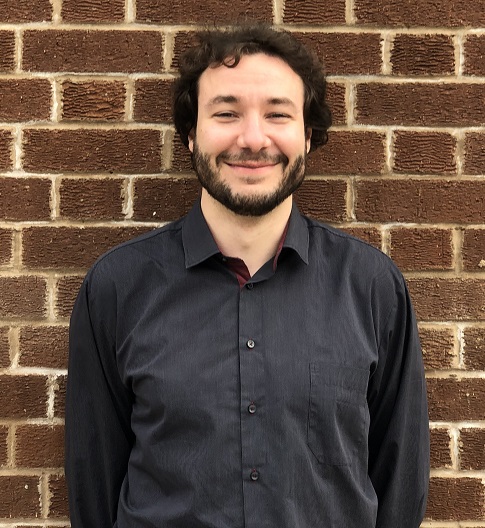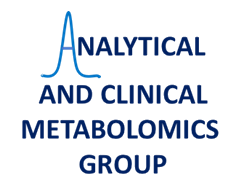Principal Investigator

Professor Warwick (Rick) Dunn
Professor Warwick (Rick) Dunn holds a chair in Analytical and Clinical Metabolomics at the University of Birmingham. He graduated from the University of Hull with a BSc(Hons) degree in Analytical Chemistry and Toxicology and a PhD in collaboration with BP Chemicals focussed on the development of interfaces to couple mass spectrometry to chemical process plants for online monitoring.
After his PhD he worked in a number of analytical chemistry roles in industry (Croda Chemicals and Huntingdon Life Sciences) and academia (Rothamsted and University of Sheffield) before moving to the University of Manchester in 2003 to work as a post-doctoral researcher focused on metabolomics in the group of Professor Douglas Kell and subsequently in the group of Professor Roy Goodacre.
Rick obtained a lectureship in 2011 at the University of Manchester and moved to a lectureship at the University of Birmingham in 2013. His research goals match those of the ACM group. He is also passionate about teaching the next generation of metabolomics and metabolism researchers through undergraduate and postgraduate degrees at the University of Birmingham and as Director of the Birmingham Metabolomics Training Centre. Further information is available at my research and my research portal.
Postdoctoral Researchers

Dr Lukáš Najdekr
Dr Lukáš Najdekr obtained a MSc in Biochemistry in 2011 at Palacký University in Olomouc (Czech Republic) under the supervision of Prof. Marek Šebela. His PhD was performed at the Institute of Translational Medicine and Faculty of Medical and Dentistry at Palacký University and University Hospital Olomouc. This was focused on untargeted metabolomics for the study of inherited metabolic diseases and changes in metabolism, supervised by Prof. Tomáš Adam. In 2017, he was awarded a PhD in Medical Genetics. He moved to Phenome Centre Birmingham in 2017 as a research fellow in metabolomics and is a member of the ACM group. His current research focus lies in the development of new and more effective UHPLC methods for application in untargeted metabolomics.
– Najdekr, L. et al. Influence of mass resolving power in orbital ion-trap mass spectrometry-based metabolomics. Anal. Chem. 88, acs.analchem.6b02319 (2016).
– Najdekr, L. et al. Oxidized phosphatidylcholines suggest oxidative stress in patients with medium-chain acyl-CoA dehydrogenase deficiency. Talanta 139, 62–66 (2015).

Dr Donna O’Neill
Dr Donna O’Neill is a research technician in Phenome Centre Birmingham and a member of the ACM group who focuses on the development and application of targeted metabolite assays. She graduated from the University of Kent at Canterbury with a BSc Biochemistry in 1999 and started working at the University of Birmingham in 2000.
In 2003, she joined the Proteomics and Biomarker Discovery group at the Institute for Cancer Studies working alongside Dr Ashley Martin and Prof. Philip Johnson. During this time she studied for her PhD using proteomic techniques to investigate potential biomarkers for the early detection of colorectal cancer using a cell line model.
In 2008, she moved to the Institute of Metabolism and Systems Research working with Prof. Wiebke Arlt at the Centre for Endocrinology, Diabetes and Metabolism (CEDAM). She was involved in a multicentre collaborative network, European Network for the Study of Adrenal Tumours (ENSAT), using GC/MS and LC-MS/MS techniques to analyse steroid hormones and their precursors in serum and urine from patients with adrenocortical carcinomas. She joined Phenome Centre Birmingham in January 2016.

Dr Andrew (Andy) Southam
Dr Andrew (Andy) Southam is a research fellow in mass spectrometry metabolomics and lipidomics in Phenome Centre Birmingham and a member of the ACM group. Andy gained his PhD with Prof. Mark Viant at the University of Birmingham in 2009 characterising liver cancer metabolism in flatfish using NMR and DI-MS metabolomics. He then moved to a postdoctoral research position with Prof. Chris Bunce at the University of Birmingham as the metabolomics lead in a translational laboratory to develop blood cancer therapeutics. In 2017, he was appointed as a research fellow at Phenome Centre Birmingham. His main research interests are: (i) understanding the role of metabolism in cancer, and (ii) metabolomics and lipidomics method development including the optimisation of sample preparation, direct infusion mass spectrometry (DI-MS), and ultra-high performance liquid chromatography (UHPLC)-MS methods.
– Southam, A. D.; Weber, R. J. M.; Engel, J.; Jones, M. R.; Viant, M. R., A complete workflow for high-resolution spectral-stitching nanoelectrospray direct-infusion mass-spectrometry-based metabolomics and lipidomics. Nature Protocols 2017, 12, 310.
– Wu, H., Southam, A.D., Hines, A. and Viant, M.R., 2008. High-throughput tissue extraction protocol for NMR-and MS-based metabolomics. Analytical biochemistry, 372(2), pp.204-212.

Dr William Nash
Dr William Nash is a postdoctoral researcher within the group focused on the development of new analytical and computational tools for metabolite annotation. He completed his BSc in Biological Sciences with Industrial Placement Year at the University of Birmingham with first class honours in 2016. During this time, he undertook his dissertation with Prof. Dunn and subsequently joined his group as a PhD student shortly after graduating. His research interests are based around improving metabolite annotation for untargeted metabolomics with particular focus on MS/MS data acquisition and the complexity of ion formation when applying electrospray ionisation (ESI).
– Nash, W.J. and Dunn, W.B., 2018. From mass to metabolite in human untargeted metabolomics: Recent advances in annotation of metabolites applying liquid chromatography-mass spectrometry data. TrAC Trends in Analytical Chemistry.
PhD Students

Miss Judith Ngere
Miss Judith Ngere is a NERC-funded PhD student within the group focused on characterising and improving metabolite annotation for n-ESI-DIMS and UHPLC-MS untargeted metabolomics studies and using these tools to study the exposome. She completed an MSci in Pharmaceutical Sciences with Industrial Placement with a First class honours in 2016. Her industrial placement year at Agilent Technologies and final year master’s project both focused on development of targeted GC-MS and LC-MS methods for small molecules. Her main research interests revolve around improving metabolite annotation and identification by exploring ESI-complexity and implementing more comprehensive data mining strategies to analyse exposome datasets.

Miss Annie Harwood-Stamper
Miss Annie Harwood-Stamper is a second year PhD student. Before Birmingham she completed her MSci in Chemistry with Forensic Science at the University of Hull where she researched how to use design of experiments for the optimisation of chemical reactions. Her research at Birmingham revolves around using mass spectrometric approaches to identify metabolic biomarkers of disease in mammalian tears. Her main research interests involve developing new UHPLC-MS methods for low volume samples and evaluation of previously unexplored sample types for clinical studies.

Mr Thomas Hancox
Mr Thomas Hancox has a firm background in Molecular and Cellular Biology and is currently preparing to undertake a PhD in the ACM group utilising metabolomics alongside molecular and cellular approaches to study the impact of circadian and behaviour driven metabolite rhythms and their influence on health and aging in humans. His research interests include the clinical application of metabolomic methodologies, specifically for the discovery and identification of potential biomarkers in addition to being used within multi -omic ‘bottom-up’ studies to annotate poorly understood systems.
Past Group Members
- Dr Elliott Palmer – PhD student in ACM group with his research focussed on dried blood spot development and analysis for biomedical metabolomics applications
- Dr Giovanny (Gio) Rodriguez Blanco – post-doctoral researcher in ACM group and Phenome Centre Birmingham
- Dr Andrew Chetwynd – post-doctoral researcher in ACM group and Phenome Centre Birmingham
- Dr Riccardo Di Guida – PhD student in ACM group with his research focussed on untargeted metabolomics data processing and the interaction between steroid hormones, insulin and drug treatments.
- Mr Aneesh Kumar – a visiting PhD student from the Rajiv Gandhi Centre for Biotechnology in India who studied stem cell metabolism during a 6-month training placement in 2017
- Miss Sonia Giambelluca – a visiting PhD student from the University of Padova in Italy who studied BAL in infant diseases during a 6-month training placement in 2018
- Mr Gianfranco Frigerio – a visiting PhD student from the University of Milan in Italy who studied metabolic changes related to smoking during a 3-month training placement in 2018
- Miss Cynthia Roy – a visiting PhD student from Centre Hospitalier Universitaire Research Centre in Canada
MSci and MRes students
The group has supervised 4 Mres and 6 MSci students since 2014
MSc students
The group have supervised 15 MSc students since 2014
Collaborators
- Professor Mark Viant – metabolite annotation/identification, University of Birmingham (UK)
- Dr Ralf Weber – metabolite annotation/identification, University of Birmingham (UK)
- Professor Wiebke Arlt – steroid hormone metabolism, adrenal tumour biomarkers and PCOS, University of Birmingham (UK)
- Professor Janet Lord – burn trauma, University of Birmingham (UK)
- Dr Sarah Aldred – metabolism during exercise, University of Birmingham (UK)
- Dr Gareth Wallis – metabolism during exercise and diet, University of Birmingham (UK)
- Dr Simon Afford – liver transplantation, University of Birmingham (UK)
- Professor Georg Lietz – hypervitaminosis A, University of Newcastle (UK)
- Professor Nic Timpson – hyperlipidemia and APOC3, University of Bristol (UK)
- Professor Philip Atherton/Dr Kenny Smith/Dr Dan Wilkinson – muscle metabolism in relation to age, exercise and diet, University of Nottingham (UK)
- Professor David Broadhurst – data quality and analysis, Edith Cowan University (Australia)
- Mrs Claire O’Donovan – metabolite annotation (EMBL-EBI (UK)
- Dr Matthew Lewis – untargeted and targeted metabolomics workflows including data quality and metabolite annotation, Imperial College London (UK)
- Thermo Scientific – the group collaborates closely with this large global scientific instrument company on dried blood spot analysis and metabolite annotation.
- DSTL – the group collaborates closely with this laboratory on UHPLC-MS assays for low volume samples and on metabolic changes in bioterrorism incidents
- IMSR – the group collaborates with multiple investigators in the institute including Prof. Wiebke Arlt, Prof. Gareth Lavery, Dr Niki Karavanti, Dr Alex Sinclair and Dr Ab Tahrani.
